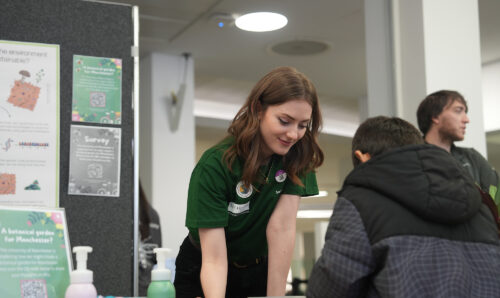A moment on the lips, a lifetime off the planet?
Research impact and institutes 3 July 2019
A team of scientists led by The University of Manchester have been selected to present their work on climate change as part of this week’s Royal Society Summer Science (RSSS) Exhibition – but their work might put you off your barbecue.
The Take A Bite Out Of Climate Change exhibit will show visitors how the decisions they make in the supermarket and the kitchen can impact the planet – and how, by making different choices, they can help reduce global warming.
Relight my fire

As last weekend’s heatwave prompted people across the UK to pile up the coals and fire up the barbie, there’s no better place to start than with the traditional British BBQ.
According to the scientists behind the Take A Bite research – which includes academics from food resilience programme N8 Agrifood as well as those working on technological solutions at STFC Food Network+ – a typical BBQ releases 5,800 gCO2e into the air. Translated into layman’s terms, that’s the same as you’d expect to be released on a 60-mile car journey – and that’s a lot of carbon for your chargrill.
Just a single medium-sized beef burger releases the same amount of greenhouse gas as a 15-mile car ride, according to Take A Bite’s Lead Scientist Professor Sarah Bridle. That’s enough to fill more than 60 balloons. Then there’s that bottle of beer you wash the burger down with – that’s another ten balloons.
The beef with beef

But you don’t have to throw away your tongs quite yet, because Take A Bite also reveals how making different choices can reduce your impact on the climate without having to forgo your favourite summer tradition.
For example, switching beef burgers with chicken significantly reduces carbon emissions. Rather than producing the typical BBQ’s equivalent of 225 balloons of greenhouse gases, a chicken BBQ is equal to 125 balloons.
Go vegan and you can reduce the damage even further. Vegan sausages with onions rather than cheese followed by strawberries with sugar instead of cream is equal to a 20-mile drive. This means it produces just a third of the emissions a typical beefy BBQ creates.
“Food contributes over 20 per cent of all greenhouse gas emissions,” explains Prof Bridle. ”As the barbecue season gets underway, people might like some food for thought about the impact of their choices on the environment.”
And it’s not just barbecuing where it pays to be mindful about your menu’s impact on the planet. “By making a few small changes to our diets such as swapping beef for chicken or a vegetarian alternative, a fizzy drink to tap water, a cheese sandwich to a peanut butter sandwich, or a fry-up breakfast to porridge we can make a significant impact,” says Prof Bridle.
Sinful sarnies

So now we’ve ruined your favourite summer treat for you, let’s move on to spoiling your lunch too. That sandwich you bought? It’s no friend of the planet.
Research published last year by researchers at the School of Chemical Engineering and Analytical Science found that we chow down on more than 11.5 billion sarnies every year in the UK. Examining 40 popular sandwich recipes, the researchers concluded that the carbon footprint they created could be reduced by half if changes were made across all points of the production chain.
Ditch the lettuce, tomato, mayonnaise, beef and pork and you’ve got yourself a greener sandwich, as all these ingredients have a large carbon footprint. Rather than a breakfast sandwich, go for an egg and cress – or better yet, make your own sandwich at home, which cuts out more of the waste and packaging.
Obviously making a brew at home is also better for the environment than picking up a takeaway coffee or tea – but even the humble kettle is contributing to the slow boil of climate change. Irresponsible brewing has a knock-on effect on the planet, as 80 per cent of a kettle’s environmental impact is caused by the user.
For example, do you fill the kettle then pour a single cup? Just boiling what you need could reduce the environmental impact of your kettle by a third.

In 2019, it’s hard to escape the reality that every little thing we do affects the environment in some way. But, as the Take A Bite showcase has shown thousands of visitors to the RSSS Exhibition this week, our choices can have a positive impact too.
To discover the environmental impact of individual foods, take a moment to play the Take A Bite Out of Climate Change game here.
If this didn’t put you off your lunch, be sure to subscribe on our homepage to keep up to date with all the latest posts from The Hub.
Words – Hayley Cox
Images – mtberscott, Take A Bite Out Of Climate Change, Rachel Hobson




